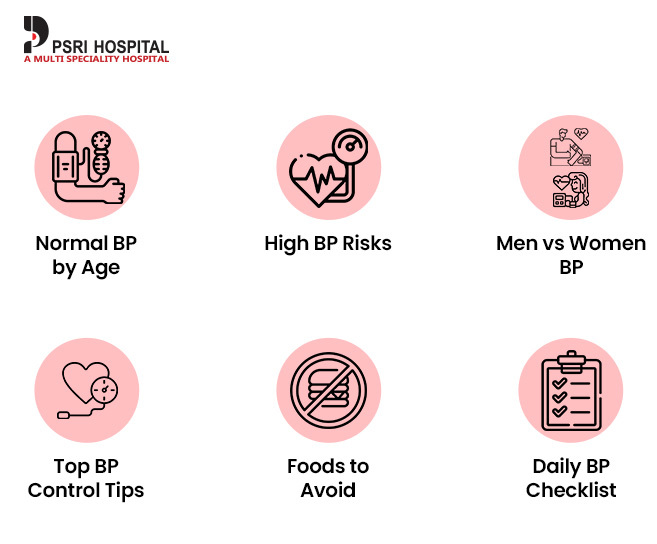Blood Pressure: Normal Ranges for Men and Women and Tips for Maintaining Healthy Levels

A silent but powerful indicator of your cardiovascular health, blood pressure can quietly shape the trajectory of your well-being. Whether you’re a working professional, a caregiver, or a healthcare provider, understanding blood pressure normal ranges for men and blood pressure normal ranges for women is essential for early risk detection and long-term prevention.
While a reading on the cuff may take seconds, the implications of abnormal numbers can echo for years. This blog cuts through the noise with evidence-based insights, ideal ranges by gender and age, and proven strategies to manage blood pressure effectively.
Understanding Blood Pressure: What Do the Numbers Mean?
Blood pressure measures the force of blood pushing against artery walls. It is recorded using two numbers:
- Systolic (Top Number): Pressure during heartbeats.
- Diastolic (Bottom Number): Pressure between beats.
For example, a reading of 120/80 mm Hg means:
- 120 mm Hg (systolic)
- 80 mm Hg (diastolic)
Maintaining healthy blood pressure isn’t just about avoiding hypertension—it’s about protecting your brain, heart, and kidneys from long-term damage.
Normal Blood Pressure Ranges for Men
Blood pressure can vary slightly based on age and lifestyle. However, general guidelines help define what’s considered “normal” in men.
Note: A reading less than 120/80 mm Hg is generally considered normal for adults, but slight increases can be common with age.
| Age Group | Normal Range (mm Hg) |
|---|---|
| 18–29 | 119/70 |
| 30–39 | 121/72 |
| 40–49 | 124/77 |
| 50–59 | 127/78 |
| 60+ | 130/80 |
Key Factors Influencing Blood Pressure in Men:
- Higher prevalence of smoking and alcohol use
- Greater stress exposure in high-demand roles
- Obesity and sedentary lifestyle
- Genetic predisposition
Takeaway: Regular monitoring is vital. Even a slight deviation from blood pressure normal ranges for men should prompt lifestyle adjustments or medical consultation.

Blood Pressure: Normal Ranges for Women
For women, hormonal changes (e.g., pregnancy, menopause) can significantly influence blood pressure levels. Hence, separate evaluation standards are often needed.
Note: A reading below 120/80 mm Hg is generally normal for adult women, though slight variations with age are common.
| Age Group | Normal Range (mm Hg) |
|---|---|
| 18–29 | 110/68 |
| 30–39 | 112/70 |
| 40–49 | 116/74 |
| 50–59 | 122/76 |
| 60+ | 130/78 |
Additional Considerations for Women:
- Blood pressure may drop slightly during the first and second trimesters of pregnancy.
- After menopause, risk of hypertension increases due to reduced estrogen.
- Birth control pills and hormone replacement therapy can affect readings.
Insight: Keeping a close eye on blood pressure: normal ranges for women—especially during life transitions—can prevent complications like stroke or heart disease.
The Hidden Risks of Abnormal Blood Pressure:
Ignoring abnormal blood pressure—whether high or low—can lead to severe consequences:
High Blood Pressure (Hypertension):
- Increases risk of heart attack, stroke, kidney disease
- May go unnoticed for years due to lack of symptoms
- Causes artery walls to harden over time
Low Blood Pressure (Hypotension):
- Can cause dizziness, fainting, blurred vision
- May signal underlying problems such as dehydration or heart issues
- Dangerous when it drops too suddenly
Tips for Maintaining Healthy Blood Pressure Levels:
Healthy blood pressure isn’t luck—it’s strategy. Here’s how you can stay within the ideal range:
1. Eat a Heart-Healthy Diet:
- Prioritize fruits, vegetables, whole grains
- Reduce sodium intake (less than 1500 mg/day)
- Incorporate potassium-rich foods like bananas, spinach, and sweet potatoes
2. Stay Physically Active:
- Aim for at least 150 minutes of moderate-intensity aerobic activity per week
- Add resistance training 2–3 days/week
- Walk, swim, cycle, or take the stairs—consistency is key
3. Maintain a Healthy Weight:
- Even a 5–10% weight reduction can lower blood pressure
- Avoid crash diets; adopt sustainable eating habits
4. Limit Alcohol and Quit Smoking:
- Alcohol raises blood pressure and weakens the heart
- Nicotine constricts blood vessels, causing immediate BP spikes
5. Manage Stress Effectively:
- Practice yoga, mindfulness, or meditation
- Prioritize sleep (7–9 hours/night)
- Avoid overcommitting and set realistic goals
6. Regular Monitoring:
- Use a validated digital BP monitor
- Check BP at the same time daily
- Keep a record and consult a healthcare provider for any anomalies
Gender-Specific Strategies for Blood Pressure Control:
For Men:
- Monitor stress levels related to work-life balance
- Limit high-protein supplements if not medically recommended
- Address sleep apnea, which is more common in men
For Women:
- Check BP during each trimester if pregnant
- Discuss hormonal medications and their effects on BP with your doctor
- After menopause, increase calcium and magnesium intake
When to Seek Medical Help?
While lifestyle management is crucial, some cases require clinical intervention. You should seek professional help if:
- BP readings consistently remain above 130/80 mm Hg
- You experience headaches, vision changes, or chest discomfort
- You have risk factors like diabetes, obesity, or a family history of hypertension
PSRI, recognized as the best cardiac hospital in Delhi, offers specialized diagnostic and interventional services to support heart health at every stage of life. With a team led by some of the best heart surgeons in Delhi, patients receive evidence-based, holistic care tailored to individual needs.
Role of Hospitals in Long-Term Blood Pressure Management:
Beyond the home and workplace, hospitals play a crucial role in blood pressure management:
- Comprehensive cardiac check-ups and early detection
- Holter monitoring and ABPM (Ambulatory Blood Pressure Monitoring)
- Personalized treatment plans involving cardiologists, dietitians, and physiotherapists
- Medication adjustments and close follow-up
Choosing the best hospital in New Delhi is not just about reputation—it’s about trust, accessibility, and continuous care. PSRI brings all three together, ensuring your cardiovascular journey is proactive and personalized.
Final Thoughts!
Blood pressure is more than a number—it’s a reflection of your current health and a predictor of your future. Understanding the blood pressure normal ranges for men and blood pressure: normal ranges for women gives you the power to act early and wisely.
The most effective health strategies are preventive. Monitoring your blood pressure regularly, eating smart, managing stress, and partnering with trusted healthcare professionals can help you live not just longer—but better.
Frequently Asked Questions:
Q: What is a normal blood pressure reading?
Ans. A normal reading is around 120/80 mm Hg, though it can vary slightly by age and gender.
Q: Can blood pressure differ between men and women?
Ans. Yes, men and women often have different normal ranges due to hormonal and physiological factors.
Q: What lifestyle changes help control blood pressure?
Ans. Healthy diet, regular exercise, stress management, limited salt intake, and quitting smoking are key changes.
Q: How often should I check my blood pressure?
Ans. Adults should check it at least once every 1–2 years, or more frequently if at risk.
Q: What symptoms indicate high blood pressure?
Ans. Often silent, but may include headaches, dizziness, blurred vision, or chest discomfort in some cases.
Q: Is low blood pressure a cause for concern?
Ans. Yes, if it causes symptoms like fainting, fatigue, or dizziness, it should be medically evaluated.

 Book An Appointment
Book An Appointment Virtual Consultation
Virtual Consultation





